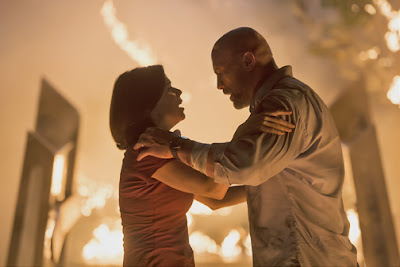Four stars. Rated R, for dramatic intensity, alcohol abuse, nudity, sexual candor and relentless profanity
By Derrick Bang • Originally published in The Davis Enterprise, 7.27.18
The quickest entry to John Callahan’s caustic, macabre and self-deprecating sense of humor is to understand that this film takes its title from his 1989 autobiography, written 17 years after the traffic accident that left him a C5-6 quadriplegic.
 |
| As John Callahan (Joaquin Phoenix) begins to morph into an actual human being, he's helped along the way by the kindness and patience of Annu (Rooney Mara). |
His scratchy, hilariously irreverent cartoons appeared everywhere for a time, from Omni and Harper’s to National Lampoon and Penthouse. Most notably, his work was featured for 27 years in the Portland, Ore., newspaper Willamette Week, where both he and the staff delighted in the occasional protests and boycotts by enraged readers.
That reaction remains true to this day. You can’t help laughing at most of Callahan’s work, but then — just as quickly — you wonder whether you should.
All this said, he isn’t necessarily an ideal subject for a biographical drama … particularly one that wishes to be factually and emotionally accurate. He was as aggressively confrontational as his cartoons; for quite a number of years before and after the accident, he also was an exceptionally nasty alcoholic. It’s not easy to spend two hours with such an unpleasant person, and Joaquin Phoenix doesn’t hold back; his depiction of Callahan is quite brutal at times.
But we are a species which, by nature, believes in the miracle of epiphanies … and few individuals have undergone a greater change. That isthe stuff of captivating film dramas.
Director/scripter Gus Van Sant has spent the bulk of his career crafting compelling sagas about equally challenging — and often unlikable — individuals, from Drugstore Cowboy and My Own Private Idaho up through To Die For, Elephant and Paranoid Park. His films intrigue not only for their unusual characters, but also for the often non-linear manner in which he lets a saga unfold.
That’s particularly true of Don’t Worry, which structures its (more or less) chronological narrative via Callahan’s candid recollections, as depicted during numerous Alcoholics Anonymous meetings; a chance encounter with young neighborhood skateboarders; and while addressing a crowd at a popular public presentation, after he had become quite famous. These sequences are further interspersed with animated versions of Callahan’s signature cartoons.
The running thread — the moral — is consistent throughout: Don’t feel sorry for yourself. Shrug it off, whatever it is, and take control.
A valuable lesson: one that took Callahan years to recognize, understand and embrace.






